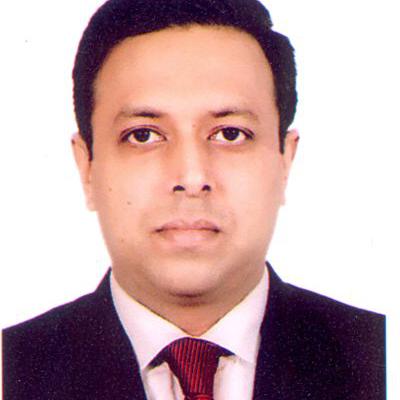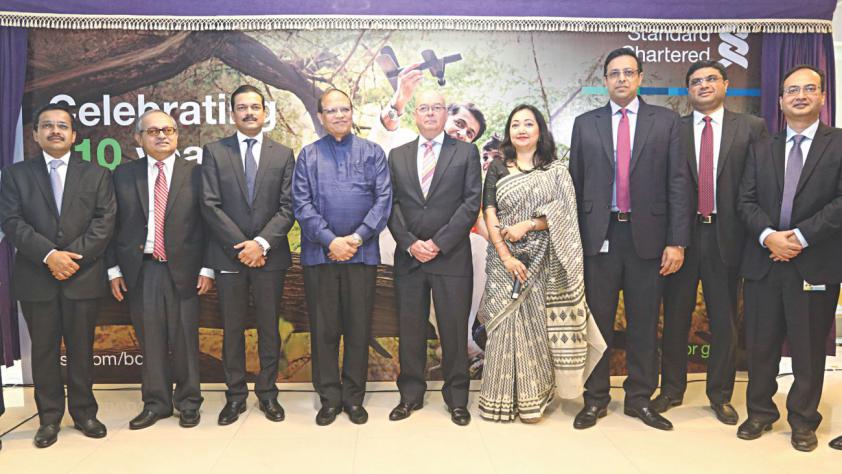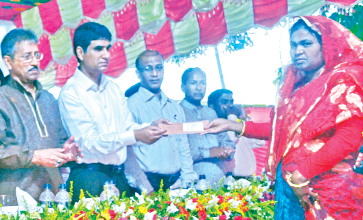Islami Bank RDS: Empowering Women in Rural Bangladesh
Business Desk :Islami Bank's Rural Development Scheme, started in 1995, has brought change in the living standard of more than nine lac people of more than 18 thousand villages in 64 districts like Hasnara Begum through extending microfinance facility, says a press release.Hasnara Begum, a rural housewife, nourished a dream to be a self reliant, a solvent one by pursuing education. No sooner had completed education; she came to Khash Hawla Village on the Bank of Bharhmaputra in Norshindhi district as housewife. Her husband was a poor peasant. Their family was passing amid twilight of sorrow and happiness. Hasnara has never been frustrated. She tried to move the wheels of her fate, started poultry farming at her house yard with her little savings. She employed her dedication and hard working to get solvency. She intends to do something wider. She heard about Islami Bank to her neighbors.Hasnara became a member of Rural Development Scheme (RDS) of the Bank. Her fate was getting change. She bought cows, trolley and a piece of land for business purpose. She is now solvent and enjoying a happy family life with her two sons and a daughter. Days passing, her income is also increasing. Hasnara is grateful to Islami Bank for gearing up her wife towards success. A research said, a few years back, poverty was the regular associate of the rural people. Women and children were the hapless victims of the unemployment. Children used to help in agricultural works and remained busy in household activities. The women had no opportunity to participate in income generating activities. This dire situation has been getting change with the recent Government and Non-government endeavors. Role of RDS in empowering women is being reflected everywhere. Islami Bank has been paving the way of financial inclusion in Bangladesh by canopying thousand of unbanked people in the banking services as the associate in bringing change in their workless lives. The bank's RDS investment stood Tk18, 197 million up to April 2015. This scheme, aims to improving living standard of the rural population through poverty alleviation, rural employment generation and income maximization by extending investment facilities in agro and agro based sectors resulting in minimizing rural-urban gaps. RDS members are encouraged to build savings, shown to the way of self-independency. The bank starts investing from Tk. 5 thousand in this scheme. They use investment money in the agriculture, poultry, small business, cottage, and other industries. Bank officials advise them for development. They coordinate between their enterprises and small investment program of the Bank. They encourage the RDS clients in cleanliness, primary health care, importance of children's education, savings habits and to build a relationship of mutual social life.The RDS of Islami bank has emerged as a friend of vulnerable rural people in the way of development. This scheme help the RDS members to become self-reliant and providing them with sanitary latrines, tube-wells, free medical care, assistance in children's wedding ceremony and providing vocational training to unemployed youths. The Bank organizes tree plantation program to protect environment and distributed sapling of forestry, fruit and medicinal plants. This scheme not only provides the investment but train the customers in developing entrepreneurship. Their children are provided with scholarships and pre-primary education facilities.
News:New Naton/25-May-2015Interest rates going down, says BB
Bangladesh Bank has said interest rates in the country have declined and banks are free to fix the level and
structure of interest rates under the market-based interest rate policy, in a clarification issued Tuesday amid the ongoing debate on interest rates.
In the statement, the central bank said the board of directors of different banks determine interest rates based on their own
considerations of profitability. Though the interest rate policy is market-based, Bangladesh Bank often sets the maximum cap for loans in different priority sectors considering the national interest and overall macroeconomic situation. The current ceiling on interestrates for pre-shipment export loans is 7 percent and for agricultural loans is 11 percent.
The BB mentioned that the effective rate of interest for the Export Development Fund (EDF) is less than 3 percent. As of today, Taka 235 billion has been financed with the EDF to the export-oriented enterprises. Around Taka 260 billion has been disbursed to the buyers' credit sector at 6 percent interest rate. The agricultural credit disbursement target for FY 2014-15 is Taka 160 billion, of which 72 percent has been disbursed during the first nine months of the current fiscal.
According to the central bank, no more than 10 percent (9 percent in most cases) interest rate can be charged under the Bangladesh Bank refinancing scheme for SMEs and women entrepreneurs, while 4 percent rebate rate is applicable for the agriculture sector for cultivation of pulses, oilseeds, and spices.
It said Bangladesh Bank has also submitted a proposal to the Ministry of Finance for providing SME loans to the dairy farms at a similar rebate rate. Taka 57 billion has been refinanced against loans to the SME sector till date. Businessmen now can avail loan facilities from foreign sources at lower rate (London Interbank Offer Rate or LIBOR plus 3 to 4 percent, which is less than 5 percent).
Over the last five years, Bangladesh Bank has approved around Tk 500 billion of loans from foreign sources. These low-cost EDF, buyers' credit, agricultural credit, SME refinance, and foreign loans are significantly contributing towards reducing interest rates in the domestic financial market. Moreover, there is a rebate on accrued rate of interest for good borrowers.
The statement said interest rate depends mainly on banks' cost of funds, administrative costs, provision expenses, profit margins, and so on. The overall cost of fund for banks is decreasing due to rationalization of various service charges, fees, commission charges, etc, avoiding high expenditure to establish bank branches, and adoption of policies towards limiting expenditure for the purchase of transport vehicles.
Though banks' one-time initial costs have increased a bit because of implementation of information technology as instructed by Bangladesh Bank, the cost of funds is gradually falling over time. In recent months, lending rate has not declined at the same pace as the deposit rate; however, with intensive monitoring and moral persuasion from Bangladesh Bank, both the lending rate and the interest rate spread have decreased to 11.93 percent and 4.87 percent respectively.
At the same time, the rate of inflation has been falling steadily with prudential monetary management from Bangladesh Bank. At the end of April 2015, the average annual rate of inflation stood at 6.57 percent, claimed the BB statement.
StanChart gets new MD

Naser Ezaz Bijoy has been appointed as the managing director and head of corporate and institutional clients at Standard Chartered Bangladesh, the bank said yesterday.
In his new role, Bijoy will be responsible for the bank's overall client relationship strategy with all corporate and institutional clients (CIC) in Bangladesh and to drive the effective delivery agenda of the CIC-related staff and products, the bank said in a statement.
Bijoy brings more than 22 years of banking experiences working with Standard Chartered Bank in corporate banking, risk and audit in Asia, Middle East and Africa.
During his tenure, he worked closely with central banks in Bangladesh, UAE, Mauritius and Vietnam for implementation of Basel accord.
Earlier, Bijoy worked as the director of board of management of Standard Chartered Bank (Vietnam) where he was vested with the responsibility of chief risk officer of Vietnam and senior credit officer, Vietnam and Philippines.
Bijoy graduated with an MBA from the Institute of Business Administration and has received overseas accreditations and certifications from Omega USA, Kesdee USA and INSEAD.
News:The Daily Star/24-May-2015StanChart relaunches collateral-free loan
The UK-based bank celebrates 110 years in Bangladesh

Fourth from left, Atiur Rahman, governor of Bangladesh Bank, and Robert W Gibson, British high commissioner to Bangladesh along with Abrar A Anwar, chief executive officer of Standard Chartered Bangladesh, pose at a programme yesterday to celebrate the bank's 110 years in Bangladesh, at its head office in Gulshan,
Standard Chartered has relaunched a collateral-free loan programme for Bangladeshi women entrepreneurs as part of its efforts to bulk up presence in all segments of its clientele in the country.
The product will offer the country's cash-strapped women entrepreneurs up to Tk 1 crore in loans, the highest collateral-free credit for women in South Asia.
Roksana Hussain, owner of Ananda Restaurant, a bakery in Narayanganj, received a cheque for Tk 40 lakh loans from the bank at a ceremony organised to celebrate its 110th anniversary in the country.
Phowzia Khan's Petro Products Company, which imports CNG conversion kits from Italy, Dubai and Korea, got a loan of Tk 1 crore.
Bangladesh Bank Governor Atiur Rahman and British High Commissioner to Bangladesh Robert W Gibson cut a cake to start the celebration at the bank's head office in Gulshan.
“Women are the best managers of money. They are least defaulter. They use the profit for kids and families,” Rahman said.
He termed the UK-based bank a good partner of the country, saying the bank is contributing significantly towards the economic development of Bangladesh through innovation of new financial products, facilitating banking, and promoting employment generation.
Rahman urged the bank to take steps so that non-resident Bangladeshis can invest online in premium bonds in the country.
He said for some years now, the central bank has been instilling socially responsible financing ethos in the entire banking sector, to realise its vision of high and inclusive economic growth with rapid poverty alleviation.
The financial inclusion campaign from the central bank targeting farm and off-farm productive economic activities is thus the major driver of inclusive growth, he said.
The governor also talked about the central bank's role in promoting environment-friendly growth, rapid digitisation in the banking sector, widening of mobile financial services and no-frills accounts for disadvantaged population segments. “I am happy to say that Standard Chartered has been an active player in this campaign, with many humanitarian activities,” he said.
Robert Gibson said the footprint of 110 years is a remarkable achievement for the bank. “It has raised financing for projects that are important for Bangladesh's growth and development.”
Abrar A Anwar, chief executive of Standard Chartered Bangladesh, said the bank never closed its doors even during the most difficult periods facing the world. “It is a testimony to our confidence in growth and development of this market.”
He said the bank assisted the central bank with reconstruction of the records that were damaged during the Liberation War and with setting up of the exchange rate mechanism. The bank also organised three investment summits on Bangladesh to relay the real stories of Bangladesh to foreign investors and bring more foreign investment to the country.
“We will not stop here. This will continue to be on the top of our agenda in the days to come,” Anwar said.
Aditya Mandloi, head of retail clients at the bank, said they would bring more innovative products for women entrepreneurs in the coming years.
Standard Chartered, which sees Bangladesh as one of its top 10 markets among 70 countries where it has operations, started its journey in Bangladesh in 1948 by opening its first branch in the port city of Chittagong.
In August 2000, the bank completed the acquisition of Grindlays Bank and inherited the Grindlays Bank's presence in the country that dates back to 1905, thus becoming the oldest and the leading international bank in Bangladesh in the process. Standard Chartered handles more than $3 billion a year in garment exports. It finances backward linkage and textile sectors so that the apparel manufacturers can widen their reach.
The bank has also arranged financing for 30 percent of the country's more than 10,000 megawatts of installed capacity of electricity, which is crucial for the economy. It is also a major player in the telecom sector financing.
The largest international bank in Bangladesh has 26 branches and booths and 83 ATMs and employs 2,000 people. It is the only foreign bank in the country with presence in six cities: Dhaka, Chittagong, Khulna, Sylhet, Bogra and Narayanganj. Its asset based in Bangladesh is worth $4 billion. Standard Chartered directly supports 1.1 percent and indirectly 1.5 percent of Bangladesh's gross domestic product, a 2013 independent study found.
Through its onshore financing, the bank supports, directly and indirectly, 466,000 jobs in Bangladesh, equivalent to about 0.6 percent of the country's total workforce.
When the bank's lending to financial institutions is included, its impact amounts to 655,000 jobs, or 0.9 percent of the labour market.
News:The Daily Star/22-May-2015RAKUB disburses loans to farmer in Dinajpur
 A farmer is seen receiving a cheque of loan at an open loan disbursement programme of Rajshahi Krishi Unnayan Bank for Dinajpur north zone, Dinajpur south zone and Rangpur zone, at Parbotipur in Dinajpur on Wednesday. Professor Dr. M Shah Nowaz Ali, Chairman of RAKUB, was present.
A farmer is seen receiving a cheque of loan at an open loan disbursement programme of Rajshahi Krishi Unnayan Bank for Dinajpur north zone, Dinajpur south zone and Rangpur zone, at Parbotipur in Dinajpur on Wednesday. Professor Dr. M Shah Nowaz Ali, Chairman of RAKUB, was present.



